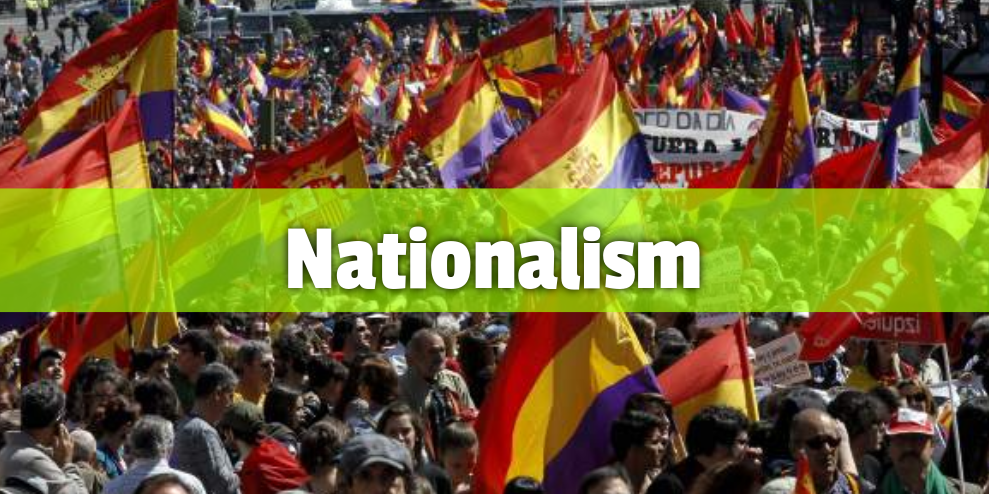Nationalism

Political ideology that defines the nation as a historical and political subject above the social classes, which would be reduced to components of the nation with specific national interests and tasks, that is, with their own interests and duties in the "common goal" of the prosperity of national capital.
Nationalism defines the nation as a historical and political subject above social classes, which would be reduced to components of the nation with specific national interests and tasks, that is, with their own interests and duties in the "common goal" of the prosperity of national capital. Duties that of course include different forms of "loyalty" to state power.
All nationalism will include, to a greater or lesser extent, the demand for a "national culture" and for the national and democratic tasks of the bourgeois revolution in the form of a permanent claim to "national sovereignty".
The critique of the concept of nation as a historical subject, that is, the critique of nationalism, involves denying the existence of any "national programme". The nation is not that unity with a destiny under which the bourgeoisie's leadership of the social whole is hidden. It is, on the contrary, an assembly of classes in conflict in which the proletariat represents a program antagonistic to everything that the nation implies.
http://dictionary.marxismo.school/NationalismWhen one speaks of the "right of nations to self-determination", one uses the concept of nation as a whole, as a homogeneous social and political unit. But this concept of "nation" is precisely one of the categories of bourgeois ideology that Marxist theory has subjected to a radical revision, showing that behind the mysterious veil of the concepts of "bourgeois freedom", "equality before the law", etc., there is always hidden a concrete historical content. In class society the nation does not exist as a homogeneous socio-political entity, but in every nation there are classes with antagonistic interests and "rights".
There is absolutely no social terrain, from the most primary material conditions to the most subtle moral conditions, in which the owning classes and the conscious proletariat opt for the same attitude and appear as an undifferentiated "people. In the realm of economic conditions, the bourgeois classes defend the interests of exploitation, and the proletariat those of labor. In the realm of legal conditions, private property is the cornerstone of bourgeois society; the interests of the proletariat demand that those who have nothing be emancipated from the domination of property. In the realm of the administration of justice, bourgeois society represents "class justice," the justice of the gentry and the rulers; the proletariat upholds humanity and the principle of taking into account the social influences on the individual. In international relations, the bourgeoisie carries out a policy of war and annexations, that is, in the present phase of the system, a policy of restrictive customs and commercial war; the proletariat, on the other hand, carries out a policy of generalized peace and freedom of exchange. In the field of sociology and philosophy, the bourgeois schools and the school represented by the proletariat are in open contradiction (...) Even in the field of supposed human relations, of ethics, of opinions on art, education, etc., the interests, the world view and the ideals of the bourgeoisie, on the one hand, and those of the conscious proletariat, on the other, constitute two fields separated from each other by a deep abyss. Where the formal aspirations and interests of the proletariat and the bourgeoisie as a whole, or its progressive section, appear identical or common, as for example in democratic aspirations, the identity of forms and slogans masks a complete rupture in content and practical policy.
In such a society there can be no collective and unitary will, no self-determination of the "nation". When "national" struggles and movements have developed in the history of modern societies, these have generally been class movements of the leading bourgeois layer, which, at best, can to some extent represent the interests of other popular strata insofar as they defend, as "national interests", progressive forms of historical development, in which the working class has not yet separated itself from the mass of the bourgeoisie-led "people" to constitute itself into a politically conscious and independent class.(...)
All these facts are more than enough to show that the "law of nations" cannot be a determining factor, from the point of view of a socialist party, of the national question. The very existence of such a party is proof that the bourgeoisie is no longer the representative of all the people, that the proletarian class no longer wears the protective mantle of the bourgeoisie, but has separated itself from it to become an independent class with its own social and political objectives. Since the conception of "people", of "rights" and of "people's will" as a homogeneous whole, is a relic of the epoch of latent antagonism in the unconscious between the proletariat and the bourgeoisie, it would be a blatant contradiction for the conscious and organized proletariat to make use of it; a contradiction not in the realm of scholastic logic, but a historical contradiction. (…)
For social democracy, the question of nationalities is first and foremost, like all other social and political questions, a question of class interests (...)
To sum up: capitalist development and the interests of the bourgeoisie require the creation of an independent national state, which later becomes an instrument of imperialist conquest. The interests of the proletariat concern only the democratic and cultural objectives of the national movement, that is, the establishment of political institutions that guarantee, by peaceful means, the free development of the culture of all nationalities living together in the same state. The working class firmly demands the equal rights of all people of all nationalities. The national programme of the working class is essentially different from the nationalism of the bourgeoisie.
Rosa Luxemburg. The National Question and Autonomy, 1908